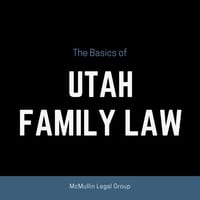Utah Family Law
This article explains the basic ins and outs of Utah family law.
- What is Utah family law? Utah family law consists of the legal obligation of those connected through domestic values. Utah family law can consist of many areas within the law such as marriage/divorce, adoption, child custody, and others. Domestic violence is sometimes considered to be under Utah family law because of the relations of persons involved.
- Marriage/Divorce: There are legal obligations and responsibilities for each spouse in a marriage. Per request, some marriages can be “annulled”, or considered to never happen in the first place. Property and child support still can be transferred in the event of an annulment, just like a divorce, according to Utah family law.
- Marriage legal obligations and responsibilities in Utah are to:
- Give consent to marriage on own terms.
- Enter marriage legally (not be currently married, legally living in the country, etc.).
- Live in the same home.
- Treat one another as a married couple.
- Present each other in public as a married couple.
- Divorce can take time and cost lots of money. When a couple file for divorce, they must wait 90 days until a court can rule the divorce as valid. Divorce can cost anywhere from several hundreds to tens of thousands of dollars.
- Distribution of Property: Utah is an equitable distribution or common law state, which means after a divorce, property is not split 50/50, but is usually split fairly between both spouses. The rule of thumb in Utah is the longer the marriage – the more fairly the distribution of property is. The shorter the marriage, the less equal it can be; normally the spouses get what they had before they were married in the event of a divorce of a short marriage according to Utah family law.
- Domestic Violence is the act of violence committed by someone in relation to who was hurt, usually in the form of physical, emotional, sexual, or economic abuse. The relation does not have to be a blood relation – they can be half-siblings, dating, or simply living in the same household. This is a crime based on the condition and severity of any injuries, if a child was present, or if any legal documents were violated such as a restraining order. Facts and witnesses are important when it comes to evidence in a trial, especially if it reaches court. Attorneys know what to look for and will help anyone present their case in the best way.
- Adoption: Any adult in Utah can adopt, but the adopter must be at least 10 years older than the adoptee. The courts in Utah look at the best interest for the child in adoptions, just like child custody. Adoption costs anywhere from a few hundred dollars, to a few thousand. In Utah, many adoption fees get reimbursed by the state, which results in some adoptions being fully covered.
- Surrogacy: There are two types of surrogacy: traditional and gestational. Both are legal in Utah, but they must be validated by a court. In order to complete a surrogacy, those who will be the parents of the child must be married.
- Juvenile Court: Unlike a regular public adult court, juvenile courts are private. Juveniles cannot request a jury trial, or post bail in order to leave detention. However, just like regular court, the juvenile’s can ask questions of the person accusing them; and if they desire, to ask a higher court to see the case further if the juvenile is found guilty.
- Paternity: Paternity is being the parents of children, especially in a legal context. “Child(ren) born to unmarried parents: generally, the mother has sole legal and physical custody of the child(ren) until a court order otherwise.” However, in the case of children born to unmarried parents, there are three ways paternity can be authorized:
- Voluntary Declaration of Paternity: If parents are not married, they may sign a Voluntary Declaration of Paternity (VDP) stating that the father is the child’s biological father. This VDP adds the name of the father of the child on the birth certificate and change the child’s name if the child is less than 5 years old.
- Administrative Paternity Order: If a one or both parents apply for support, then the Office of Recovery Services will issue a Notice of Agency Action to both of the parents. Both parents can respond if they desire. Filing the Notice of Agency Action will add the father’s name to the birth certificate and change the child’s name if the child is less than 5 years old.
- Judicial Paternity Order: The parent(s) may utilize the Online Court Assistance Program to start the Decree of Parentage. This adds the father of the child’s name to the child’s birth certificate and changes the name of the child if the child is less than 5 years old.



